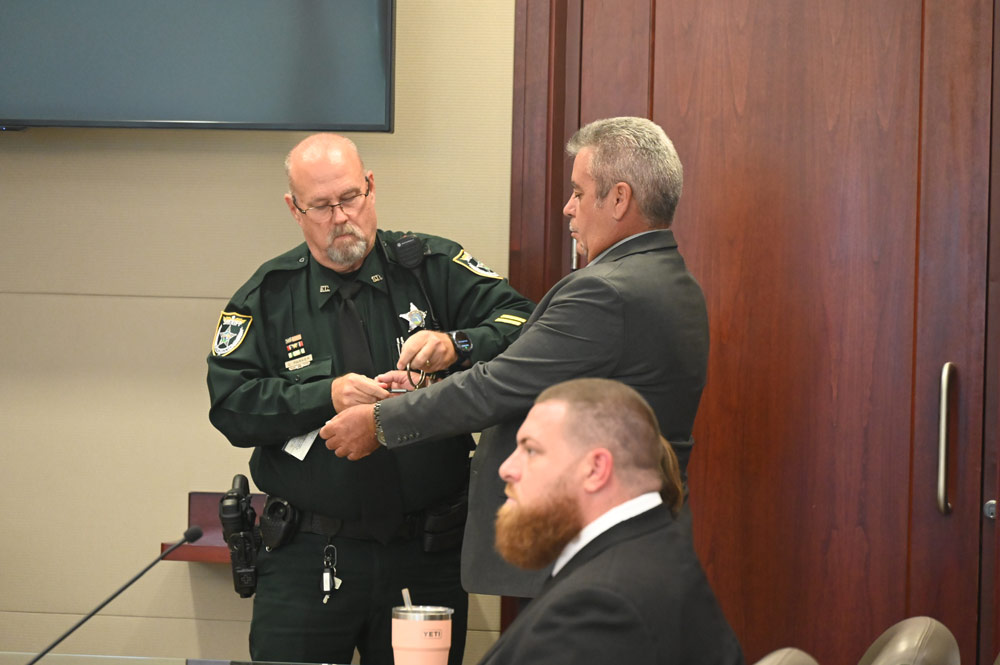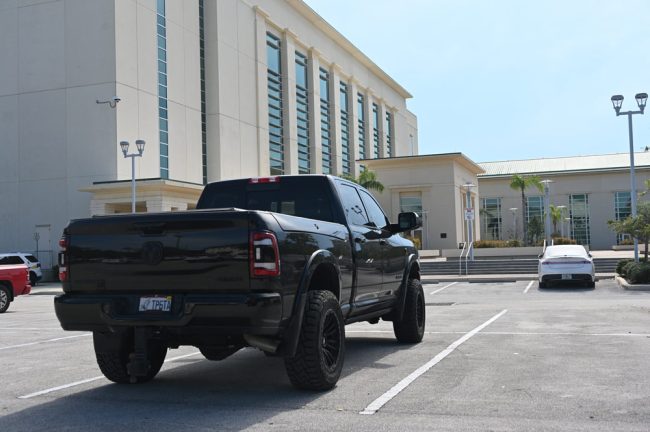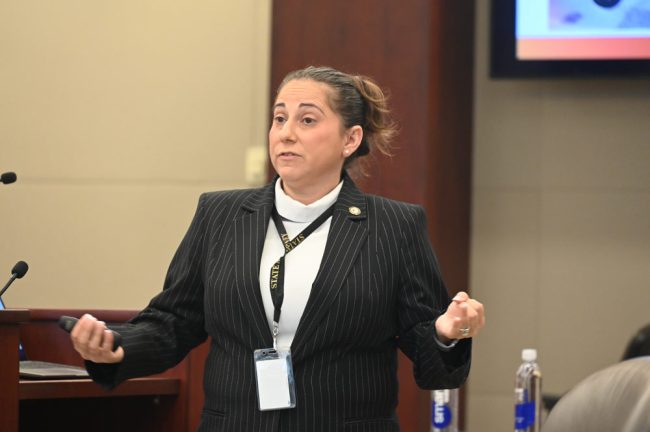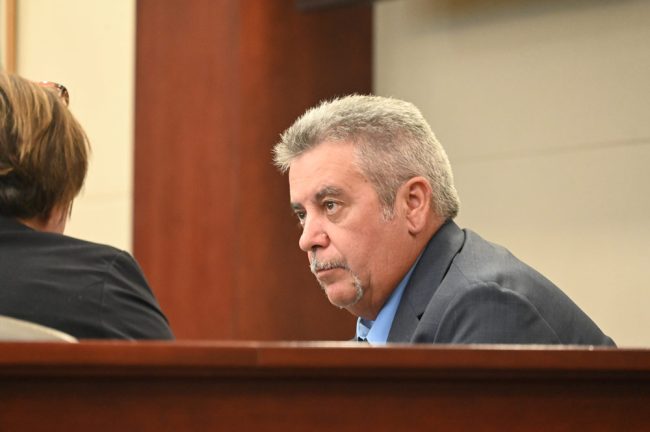
Circuit Judge Dawn Nichols had warned Joao Paulo Fernandes just five weeks ago: don’t go to trial. You’ll lose. Fernandes, a 50-year-old Palm Coast contractor, thought he knew better than the seasoned judge.
Today the jury could see and hear Fernandes’s indignation the moment he addressed the Bunnell cop who pulled him over after an alert about a hit-and-run on Belle Terre Parkway.
He’d been stopped on U.S. 1, where the cop described him “flying” recklessly away from Palm Coast that night last August, when his enormous, lifted Dodge Ram 1500 struck 23-year-old Tristan Thompson as he was riding his motorcycle with friends on Belle Terre south of Buddy Taylor Middle School.
Fernandes was incensed with the cop. “Why are you stopping me?” the 50-year-old said on bodycam video played for the jury. “You’re questioning me. Why are you stopping me?” He challenged the cop, who told him about the motorcycle incident in Palm Coast. Fernandes didn’t deny it. He blamed the motorcyclists. They were “swerving all over the place.” They thought they owned the road.
The cop had noticed damage on the passenger flank of the Dodge. Fernandes said he didn’t hit anyone. One of them hit him. His defense would later claim, as it did in court for the past two days, that he had no idea he’d struck Thompson. Had no idea he’d sent him crashing on the grassy shoulder with four broken ribs, four or five damaged discs, a concussion, a collapsed lung, a fractured hand, and a broken leg that kept him from regaining mobility for months. So he had no reason–no obligation–to stop.
And if he was flying down U.S. 1, even though the crash took place within blocks of his house in the P Section, where he was returning after dinner that night with his wife, it’s not because he was trying to get away from something. It’s not because he’d become so enraged that, instead of making the turn onto Pritchard Drive, as he’d begun to, he got enraged and gunned it and–as a witness described it–struck Thompson, then drove on furiously.
No, it was none of that. It’s because he’d decided to see family near the Mondex. Or to get away from the motorcyclists, as his wife would testify, to not show them where they lived, though neither she nor her husband said as much to the cop in Bunnell. The jury found their story hard to believe.
Fernandes had been out on $2,500 bond since last August. If one thing showed his prideful arrogance more than any other, if one thing italicized his indifference, if not his guilt, it was his decision on Monday and today to drive the very same suspect truck to court. His wife, a nurse, testified that it was his work truck (he has a concrete business, laying down patios, foundations, sidewalks), that they had at least one other vehicle. Obviously, they could’ve driven another. But he chose to drive the truck. He chose to park it near the front of the stairs up to the courthouse plaza.

And there it sat in its massiveness. The jury could see it, as it had on bodycam footage, every time it stepped in and out of the courthouse. There Tristan Thompson, the victim, could see it every time he arrived for court, every time he stepped out for lunch, every time he might need a drink or visit the restroom, because the huge third-floor hallway windows look over the parking lot, and you just couldn’t miss that hulk, shining black against the asphalt gray around it.
It was as if an accused child abuser had worn to court the belt he’d used to whip the child, though the object would have been seized for evidence. Thompson wasn’t that fortunate. The truck wasn’t impounded.
Judges warn juries not to look up evidence on their own, not to go to the scene of a crime, to look up pictures cars or trucks involved or conduct their own independent research.
For two days, Fernandes did it for them, thumbing the evidence in front of them.

The jury of two women and four men couldn’t have possibly missed Fernandes’s hubris, in or out of the courtroom. That, as much as the evidence Assistant State Attorney Tara Libby presented, which was not lacking, likely played into the jury’s swift decision this afternoon. It took just 27 minutes to reach a verdict, counting from the moment it left the courtroom.
Fernandes was guilty of leaving the scene of a crash with serious bodily injury, a second-degree felony punishable by up to 15 years in prison.
He sat unmoved and unmoving as he listened to the verdict. His wife, two rows back in the gallery, slumped into her hands, sobbing amid family. Earlier in the day she’d taken the stand as the only witness for the defense, but her answers came across clipped, her tone harsh, resentful, her eyes looking down more often than up, rarely making contact with the jury. It was a sharp contrast with Thompson’s testimony this morning. He’d been poised, calm, showing no hint of vengefulness or anger, just answering questions directly, neutrally from behind white horn-rimmed glasses that made him look like a high school senior rather than a 24-year-old.
As the clerk read the verdict Thompson and his family looked on from their side of the gallery, holding hands but otherwise showing no emotions until later in the hallway–within sight of the truck, which was not to be driven home by its owner that afternoon.
Fernandes was put in handcuffs, to more subs from the gallery, and ushered out and to the Flagler County jail, where he will await sentencing, which may not be for a few weeks yet.
A charge like this would not ordinarily warrant press coverage. This was not an ordinary case. Fernandes was in court June 5 with his lawyer, Brian Penney, where Libby had told the judge that the state had offered him a plea deal: one year in prison (actually less: with gain time, or time off for good behavior, he’d have been out in a little over 10 months). Fernandes turned it down. He would only serve a single year on probation.

Circuit Judge Dawn Nichols was taken aback. She called Fernandes’s counteroffer “offensive to the state.” She all but pleaded with Fernandes and his attorney to be more reasonable, not to risk up to 15 years in prison if the case went to trial. She had seen the evidence. She all but predicted a guilty verdict. “Ms. Libby’s not going to ask for three years. She’s going to be asking for more than three years,” the judge warned. “So that 366 offer is looking pretty darn good.”
Fernandes would hear none of it. His hubris came across that day, too, the way he responded to the judge. “We’re going to trial,” he said. He’s now going to prison, as the judge had warned. The only question is for how long, though it’ll be more than a year.
“There was no crash Mr. Fernandez was aware of,” Penney told the jury in his closing argument. (He tried the case with defense attorney Tammy Jacques.) “The only contact he was aware of was with Mr. Giles, which is why he kept saying there was no crash.” Thomas Giles was one of the friends Thompson was riding with. Giles testified that Fernandes had been riding his tail, and in frustration at one point Giles got parallel to him and took a swipe at Fernandes’s mirror, which he said he missed. Giles then sped on. Shortly afterward, the collision with Thompson took place.
“The state would like you to believe they carry their burden,” the defense attorney continued. “As you can see, it is a tall burden to fill. The state wants you to convict an innocent man because of their perception. That is not justice.”
Libby, the prosecutor, put it simply. It was “road rage.” Fernandes was angry with the motorcyclist. So he went for one of them. “He was running. And why did he do that? Why was he speeding” on U.S. 1, she told the jury. “Why was he weaving in and out of traffic? Because he didn’t want to get caught. Because he knew what happened. Because he knew the damage to his vehicle. That damage right there, fresh damage.” An image of the black truck flashed on the overhead screens.
That truck that Fernandes made sure no one could avoid–not that night, not yesterday, not today.
Nichols won’t be sentencing him. She had to toggle two trials this week. So she gave this one to Senior Judge Terence Perkins, back for his first trial since he retired last September. Since he presided over the trial, he will return for the sentencing, but not before a pre-sentencing investigation is completed. That could take up to six weeks.
That hearing is expected to be more wrenching than the trial. Family members from both sides will likely testify. The prosecution will ask for several years in prison, the defense for as few as possible, and Perkins will decide.





























Steve says
Give him the maximum. The Judges are way too lenient on Hit and Run cases involving injury or death.i.e. Jayden Jackson
Bo Peep says
Oops.
R.S. says
I find the plea-bargaining a most offensive a way of doling out justice. If the effort to clear one’s guilt is worth penalizing at the tune of some 15 years, then the attempt to encourage false admissions of guilt merely saves a buck or two from the judicial budget; it is not an attempt to find justice. There should be a limit to what a sentence could possibly be after the plea bargain has been rejected. Plea bargains will tend to intimidate folks who cannot afford a high-powered legal eagle; instead of increasing the confidence in just procedures.
Pat Stote says
Mr. Fernandes showed his arrogance from the minute he was stopped by the sheriffs, to the parking of the same vehicle, that injured Mr Thompson, right in front of the the courthouse. That was the biggest FU ever to the jury and Mr Thompson.
It’s easy to say why the jury took only 28 minutes to find him guilty of all charges,
Hopes he gets the maximum sentence!
Jose says
I rather see a heavy fine like 20.000 to the victim and 12 of community sentence
Diane says
Wow! Just wow! How arrogant do you have to be to not take the plea deal and think you will win in court?? As one commenter said, Fernandez showed his arrogance from the minute he was stopped by the sheriffs. And, then he thinks he knows better than the judge when she basically begged him to take the plea deal because he would not win in court. He was give way too sweet of a deal bargain and declined it. Some people just think they are above the law. SMH. Please give him all 15 years! We don’t need people like him on our streets.
Doug says
It doesn’t pay to show arrogance to the sitting judge. Enjoy your prison stay.
Skibum says
It just might be that the glaring vision of the defendant’s truck parked up front and near the courthouse stairs where jurors would have had to walk close by, turned out to be Exhibit A in the guilty verdict that will send the defendant away to prison for who knows how many years. He had a penchant for showing his arrogance… could parking that behemoth truck that was used in the hit and run front and center near the courthouse steps have been an intentional, “in your face” message to the court and jury that had his fate in it’s hands? Sometimes karma really is a b***h!
Mark says
These bikers do you think they own the roads it’s insane
Andrew giles says
Worst thing was thomas is my little brother and me and my other twin were there with him, was the 4 of us heading home to enjoy tristen and Thomas visiting from Orlando. His first time riding with a group and this guy ruined it for him. Sad to say I was at the front so I head no idea of the tailgating bs until it was too late. Night was ruined but happy to say he’s back riding again
Bob says
You guys shouldn’t be playing around on the streets like that , no way one of you gots hurts no surprise